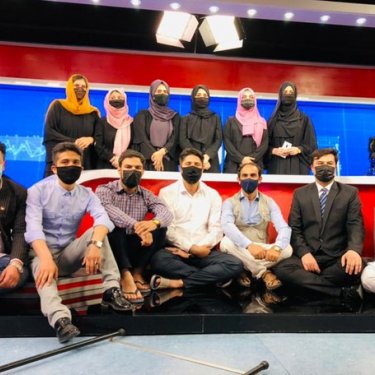RSF condemns the Taliban’s attempt to cover Afghan women journalists’ faces

Journalists’ faces have disappeared from Afghan TV since 22 May, as the Taliban ordered women television presenters to cover their faces while on air, and their male colleagues have been wearing masks in a “#FreeHerFace” solidarity campaign. Reporters Without Borders (RSF) supports Afghan women journalists and condemns this flagrant violation of their rights and of press freedom by the Taliban, which is trying to gag them.
At the start of May, the Taliban ordered all women to cover up completely when in public, preferably by wearing a burqa, which covers the entire body and face, leaving a mesh screen over the eyes. But previously, in a decree published on 22 November 2021, the Ministry for the Promotion of Virtue and Repression of Vice had imposed a number of rules on the media including a requirement for women TV presenters to wear a hijab (a generic term usually taken to mean a headscarf).
Finally, amid much debate, the Ministry went further on 21 May and, with the support of the Ministry of Information and Culture, ordered women journalists to cover their faces when on air.
“The order to women journalists to cover their faces on air is the latest attempt by the Taliban to restrict press freedom. At RSF we stand in full solidarity with these courageous journalists still working in the country, and call for the Taliban to immediately reverse this archaic measure and allow all journalists to do their jobs without interference,” said RSF Secretary-General Christophe Deloire.
The imposition of a full body covering by the Taliban, covering the mouths of women TV presenters, has triggered an outcry both nationally and internationally. Many journalists and prominent political figures spoke out against this imposition but TV channels had to make their staff comply with the order, such as TOLOnews, whose director, Khpolwak Sapai, said he was “forced” to do so.
However, on 22 May, male journalists at several TV stations, including TOLOnews and TV1, began wearing masks over their mouths, in a show of solidarity with their female colleagues. This solidarity action has grown in scale with an accompanying public #FreeHerFace campaign, which has drawn international attention.
RSF points out that the situation of women journalists in Afghanistan has deteriorated steadily since 15 August 2021, the date of the Taliban’s takeover. According to the latest RSF survey, “of the 1,190 women journalists and media workers counted in the capital at the start of August, only 320 are now working – a 73% fall.”
RSF has yet to receive a response to its open letter of 28 March to Richard Bennett, the UN’s new Special Rapporteur on the human rights situation in Afghanistan, calling for urgent action to defend journalists and press freedom in Afghanistan.
